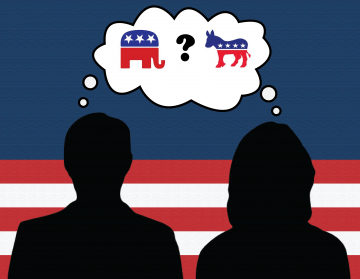 Political ideology is one of the Contexts In which we study Motivation And Goals at the MAGIC lab. In ongoing research, for instance, we ask how people feel about democracy: Who supports it, and why, and who is distressed when it deteriorates? We use a combination of archival and experimental methods to answer these questions, paying attention to differences between different political cultures.
Political ideology is one of the Contexts In which we study Motivation And Goals at the MAGIC lab. In ongoing research, for instance, we ask how people feel about democracy: Who supports it, and why, and who is distressed when it deteriorates? We use a combination of archival and experimental methods to answer these questions, paying attention to differences between different political cultures.
In another line of work, we find that people approve when those on their side of a political debate engage with and seek to understand opponents. To be honest, this shocked us. Ongoing studies test whether most people, like us, anticipate the opposite effect, and whether that might have something to do with how political conversations unfold on social media.
*A good deal of current research in the lab focuses on this topic*
Guan, K., Heltzel, G., & Laurin, K. (in press). Morality and politics. In P. A. Robbins & B. F. Malle (Eds.), Cambridge Handbook of Moral Psychology. Cambridge: Cambridge University Press.
Heltzel, G., & Laurin, K. (2024). Why Twitter sometimes rewards what most people disapprove of: The case of cross-party political relations. Psychological Science, 35, 976-994.
Benjamin, R., Laurin, K., & Chiang, M. (2022). Who would mourn democracy? Liberals might, but it depends on who’s in charge. Journal of Personality and Social Psychology. 122(5), 779–805.
Heltzel, G., & Laurin, K. (2021). Seek and ye shall be fine: Attitudes toward political perspective-seekers. Psychological Science, 32, 1782-1800. Preprint here.
Heltzel, G., & Laurin, K. (2020). Polarization in America: Two possible futures. Current Opinion in Behavioral Science, 34, 179-184.
Jost, J. T., Halperin, E., & Laurin, K. (2020). Five observations about tradition and progress in the scientific study of political ideologies. Current Opinion in Behavioral Science, 34, iii-vii.
Laurin, K. (2018). Inaugurating rationalization: Three field studies find increased rationalization when anticipated realities become current. Psychological Science, 29, 483-495.
Kreps, T. A., Laurin, K., & Merritt, A. C. (2017). Hypocritical Flip-Flop, or Courageous Evolution? When Leaders Change Their Moral Minds. Journal of Personality and Social Psychology, 113, 730-752.